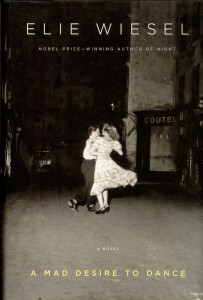By Tracy Sun
<[email protected]>
Over half a century since the publication of Night and more than 50 other books, Elie Wiesel returns with his latest fictional novel, A Mad Desire to Dance. One of the most profound and provocative writers of all time, Wiesel survived the Holocaust, Nazi cruelty and even Nadoff’s ponzi scheme which stole from his life savings and $15 million from his charity. His most recent book explores the avenues he is so familiar with, a self-diagnosed madman haunted by the painful memories of his past. However, although emotionally powerful, the novel centers around an unlikable character and tries to do too much at once.
The 60-year-old protagonist, Doriel Waldman, survives the Holocaust as a young child, only to be troubled by his memories; all of his nuclear family is deceased. Feeling defeated and insane, he goes to therapist Thérèse Goldschmidt to uncover the mysteries of his past. Uncooperative and stubborn, most of their sessions consist of arguments about psychology and philosophy. While Waldman wonders whether he is truly mad and why most of his relationships rarely last, Goldschmidt provides some insight and advice on his life experiences. After numerous discussions about his mother, a Jewish Resistance officer, and his father who died with her in a car accident, Waldman and Goldschmidt finally progress after coming to a shocking realization that changes his life forever.
 Like most of the stories he has written, Wiesel takes the reader through a plethora of emotions. From sadness and grief to laughter and joy, no emotion is left untouched. However, the most commanding and piercing passages speak about the brutality of Jewish persecution and Waldman’s recollections of his mother before her death. “The days were alike, and the nights even more so. Twice a neighbor informed on us, lured by the reward of a kilo of sugar per arrested Jew; we were forced to desert our refuge and take shelter in a hut in the middle of the forest. We slept on straw.” The pace of the beginning is fairly slow, but the plot picks up quickly after the first 100 pages and is worth the wait. The unexpected ending leaves the reader with a sense of hopefulness and refreshing optimism.
Like most of the stories he has written, Wiesel takes the reader through a plethora of emotions. From sadness and grief to laughter and joy, no emotion is left untouched. However, the most commanding and piercing passages speak about the brutality of Jewish persecution and Waldman’s recollections of his mother before her death. “The days were alike, and the nights even more so. Twice a neighbor informed on us, lured by the reward of a kilo of sugar per arrested Jew; we were forced to desert our refuge and take shelter in a hut in the middle of the forest. We slept on straw.” The pace of the beginning is fairly slow, but the plot picks up quickly after the first 100 pages and is worth the wait. The unexpected ending leaves the reader with a sense of hopefulness and refreshing optimism.
Though Wiesel’s ideas are spot on, the execution of his writing overshadows his sentiments. Too incoherent and full of ideologies, the text can be very confusing and hard to follow. Easily irritated and rude, the central character of Doriel Waldman makes it difficult for readers to relate and like him. Obviously hardened by his experiences, Waldman creates a shell so impenetrable, readers lose their sense of identification with him; only until the last fourth of the novel does he redeem himself.
With a slow start and a roller coaster of emotions and ideals, only committed readers of Wiesel should approach this book. It is not his best work, but still worth the read; fans of his literature should be pleased.
“A Mad Desire to Dance”
Genre: Historical Fiction
Page count: 274
Plot: B+
Quality of Writing: C+
Characters: B
Recommend: Yes
Overall: B



















![Joseph Broman, Mu Alpha Theta sponsor, grades tests for his honors precalculus/trigonometry class. Broman said, “I’m retiring from the Math Club next year and I’m just going to do Mu Alpha Theta so I can focus on that one and we can do more [speaker series] first semester.”](https://hilite.org/wp-content/uploads/2024/03/IMG_9502-1200x900.jpg)











![British royalty are American celebrities [opinion]](https://hilite.org/wp-content/uploads/2024/03/Screenshot-2024-03-24-1.44.57-PM.png)




















![Review: “The Iron Claw” cannot get enough praise [MUSE]](https://hilite.org/wp-content/uploads/2024/04/unnamed.png)
![Review: “The Bear” sets an unbelievably high bar for future comedy shows [MUSE]](https://hilite.org/wp-content/uploads/2024/03/unnamed.png)
![Review: “Mysterious Lotus Casebook” is an amazing historical Chinese drama [MUSE]](https://hilite.org/wp-content/uploads/2024/03/0.webp)
![Thea Bendaly on her Instagram-run crochet shop [Biz Buzz]](https://hilite.org/wp-content/uploads/2024/03/IMG_0165-1200x838.jpg)
![Review: Sally Rooney’s “Normal People,” is the best book to read when you are in a time of change [MUSE]](https://hilite.org/wp-content/uploads/2024/03/20047217-low_res-normal-people.webp)
![Review in Print: Maripaz Villar brings a delightfully unique style to the world of WEBTOON [MUSE]](https://hilite.org/wp-content/uploads/2023/12/maripazcover-1200x960.jpg)
![Review: “The Sword of Kaigen” is a masterpiece [MUSE]](https://hilite.org/wp-content/uploads/2023/11/Screenshot-2023-11-26-201051.png)
![Review: Gateron Oil Kings, great linear switches, okay price [MUSE]](https://hilite.org/wp-content/uploads/2023/11/Screenshot-2023-11-26-200553.png)
![Review: “A Haunting in Venice” is a significant improvement from other Agatha Christie adaptations [MUSE]](https://hilite.org/wp-content/uploads/2023/11/e7ee2938a6d422669771bce6d8088521.jpg)
![Review: A Thanksgiving story from elementary school, still just as interesting [MUSE]](https://hilite.org/wp-content/uploads/2023/11/Screenshot-2023-11-26-195514-987x1200.png)
![Review: When I Fly Towards You, cute, uplifting youth drama [MUSE]](https://hilite.org/wp-content/uploads/2023/09/When-I-Fly-Towards-You-Chinese-drama.png)
![Postcards from Muse: Hawaii Travel Diary [MUSE]](https://hilite.org/wp-content/uploads/2023/09/My-project-1-1200x1200.jpg)
![Review: Ladybug & Cat Noir: The Movie, departure from original show [MUSE]](https://hilite.org/wp-content/uploads/2023/09/Ladybug__Cat_Noir_-_The_Movie_poster.jpg)
![Review in Print: Hidden Love is the cute, uplifting drama everyone needs [MUSE]](https://hilite.org/wp-content/uploads/2023/09/hiddenlovecover-e1693597208225-1030x1200.png)
![Review in Print: Heartstopper is the heartwarming queer romance we all need [MUSE]](https://hilite.org/wp-content/uploads/2023/08/museheartstoppercover-1200x654.png)























![Review: Ladybug & Cat Noir: The Movie, departure from original show [MUSE]](https://hilite.org/wp-content/uploads/2023/09/Ladybug__Cat_Noir_-_The_Movie_poster-221x300.jpg)

![Review: Next in Fashion season two survives changes, becomes a valuable pop culture artifact [MUSE]](https://hilite.org/wp-content/uploads/2023/03/Screen-Shot-2023-03-09-at-11.05.05-AM-300x214.png)
![Review: Is The Stormlight Archive worth it? [MUSE]](https://hilite.org/wp-content/uploads/2023/10/unnamed-1-184x300.png)

